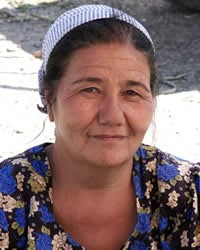Uzbek, Northern in United States

Photo Source:
Fulvio Spada - Wikimedia
Creative Commons
|
Send Joshua Project a map of this people group.
|
| People Name: | Uzbek, Northern |
| Country: | United States |
| 10/40 Window: | No |
| Population: | 68,000 |
| World Population: | 34,573,900 |
| Primary Language: | Uzbek, Northern |
| Primary Religion: | Islam |
| Christian Adherents: | 1.00 % |
| Evangelicals: | 0.30 % |
| Scripture: | Complete Bible |
| Ministry Resources: | Yes |
| Jesus Film: | Yes |
| Audio Recordings: | Yes |
| People Cluster: | Uzbek |
| Affinity Bloc: | Turkic Peoples |
| Progress Level: |
|
Introduction / History
The Uzbeks are a Central Asian people who speak a Turkic based language. The Uzbeks are located primarily in Central Asian nation of Uzbekistan. There are also large Uzbek communities in Afghanistan, Kazakhstan, Kyrgyzstan, Tajikistan and Turkmenistan, as well as small communities in many other nations, including the United States.
About half of the Uzbeks who live in the US live in New York City. They are few in number, and they started to arrive when the Soviet Union began to fall in 1990. There is a complicated "lottery" system for people from Uzbekistan and other countries that are largely not represented in the US.
What Are Their Lives Like?
The vast majority of Uzbeks who flee Uzbekistan do so because of the repressive government and limited economic opportunities. Uzbeks who migrate to the West earn far more than they did in Uzbekistan. In Western Europe, Canada and the USA, most work in modest jobs like driving cabs, security, maintenance and construction. Some of the Uzbek young people get a college degree and work in higher level jobs in education, science, engineering administration and medicine.
When an Uzbek family first arrives in the USA, they must find a place to live, learn English and put their children in school. The adults must find a job with their limited English skills.
Uzbek families try to find a balance between keeping their Uzbek culture and language and fitting into a modern industrial society in the USA. Most of their young people prefer to speak English and adopt American values and culture.
What Are Their Beliefs?
Because of 70 years of communist influence, many Muslim Uzbeks are largely secular. They may or may not be familiar with the teachings of Islam. Those who are serious about Islam are looked upon with suspicion by the Uzbek government, and also by many in the general population. Those with a spiritual mindset are suspect, so anyone taking Christ to the Uzbeks in the USA would need to make it clear that it is about the person, Jesus Christ, not about a religious or political system. Only a very few among the Uzbeks claim to follow Christ.
What Are Their Needs?
The Uzbeks have not been in the USA for very long. Most of them were born in Uzbekistan. They are eager to find people who will teach them English, leaving the door wide open for English teachers. New arrivals also need help in securing jobs, finding apartments and getting their children enrolled in school.
A complete Northern Uzbek Bible became available in 2017. Many other Christian resources exist in the Northern Uzbek language including the JESUS Film.
Prayer Points
Pray that American churches would reach out and help the Uzbeks as they arrive in their new home.
Pray that Uzbeks would desire to read the Northern Uzbek Bible hear from God from it.
Pray for the Lord to reveal himself to American Uzbeks in miraculous ways.
Pray for a disciple making movement in the USA that will penetrate Central Asian Uzbek communities both in the USA and in Central Asia.